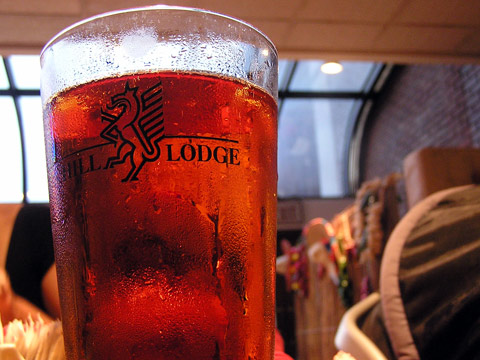The best beer in South Korea is brewed by the US Armed Forces in Yongsan Garrison, dead in the centre of Seoul. The base itself is for all intents, a small American town, albeit an American hamlet with the purpose of keeping the North Koreans in North Korea. There’s a hotel, shopping mall, free cinema, schools, a Taco Bell next to the Starbucks, a Harley-Davidson salesman, lawn-fringed beige houses that look transplanted from some faceless Midwest American exurb. An arms contractor had set up display tents in front of mall; soldiers on lunchbreak pawed at the heavy automatic weapons and stared down high-powered scopes at a Lexus in a distant parking lot. Soldiers bought American taxpayer-subsidised Xboxes and Clinique cosmetics inside the US Army’s perfect simulation of Wal-Mart. Transactions were in US Dollars only, the Korean Won unsuitable as currency. The church had a signboard advertising its summer Bible camp.
Save for the large number of camouflaged American inhabitants, jarhead haircuts and the flagrant display of high-tech killing machines, the base looks like one of the many gated communities that are spreading throughout the outskirts of Southeast Asia’s major cities: those new ghettoes of the freshly-minted Asian middle class who are just as scared of the inner city as their Western counterparts. It’s a strange place to exist in the centre of the Korean metropolis, all the more stranger that they are brewing amber ale.
Dragon Hill Lodge on the base is one of four luxury hotels owned by the US Department of Defense, built to serve holidaying active and retired military members and their families. Originally established as Hartnell House in Pusan in 1950, during the course of the Korean War it has been shifted between Taegu to Seoul several times before being laid to rest on Dragon Hill. While it was purpose-built as an Armed Forces luxury hotel, a few of the older red brick offices still in use on the camp were built by the Japanese, who occupied Korea from 1910 to 1945. The new foreign protectors taking the place of the old colonisers may have made tactical sense but for the previously colonised, it must look like business as usual. As a commercial enterprise, the hotel can’t be faulted. Last year it earned millions for America’s army and does business of a similar magnitude to its family of “Armed Forces Recreation Centers” in Germany, Hawaii and Disneyworld, Florida.
In the basement of Dragon Hill lies Oasis Restaurant, an ersatz Tex-Mex outlet. Their all-you-can-eat buffet runs the gamut of tortillas, guacamole, frijoles, Texas-style hickory smoked pork ribs with a choice of three barbecue sauces, Buffalo wings and burgers. Lobster was on special. Cola comes served in individual pitchers for each diner. Their amber ale is a genuine surprise, soldiers being enterprising but somewhat unconventional brewers.
When I was doing a little research on Grape Nuts for a previous blog post, I came across a rumour that during the Gulf War, US Armed Forces went a little crazy for the Nuts. While I couldn’t find anyone to confirm it with, Grape Nuts make a serviceable substitute for malt when attempting to brew beer under desperate lager-free combat circumstances. The Gulf being both a beer- and malt-free environment, bored soldiers stationed in the endless desert ordered and consumed tons of Grape Nuts. Yeast can be collected from either the air, sourdough-style; or fermented from bread. To substitute for hops, you would need a bittering agent of any description. Mix it all together with water in a clean jerry can with a makeshift airlock and in a few weeks it would make for a grisly ale, but ale nonetheless. Armies do not tend to be valued for their brewing prowess but their ingenuity cannot be faulted, which is why Dragon Hill Amber Ale is such a brilliant display of nonconformity to character.
The ale misses a good head but is packed full of malt and a jolting dose of fragrant hops, with a little aluminium flavour on the back palate. It’s a beer that for a moment makes you forget that you’re in Korea, fighting a war where there hasn’t been a casualty in years, staring north at an enemy who is busy both starving to death and targeting you, in the middle of a transplanted Middle American town.

Nice story, must have been an interesting visit. Really like your blog(s), always look forward to your posts.
It’s good to know that at least a few of my tax dollars are being spent on worthwhile pursuits.
At least the beer isn’t brewed with your tax dollars – I think they make a profit. The subsidised Walmart however is a whole barrel of pork.
Great article. Did you try Cass beer in Korea?
A – Yes. The only thing offensive about Cass is its inoffensiveness. I am a fan of the 1.6 litre plastic bottle, and the practice of drinking it from little paper cups in front of a 7-11 in the afternoon.
no i haven’t try it